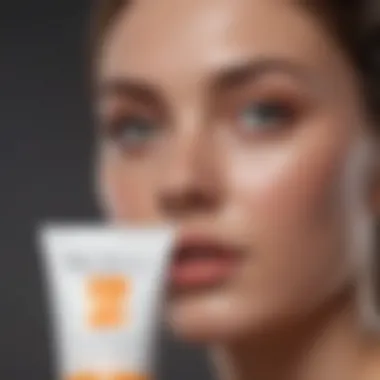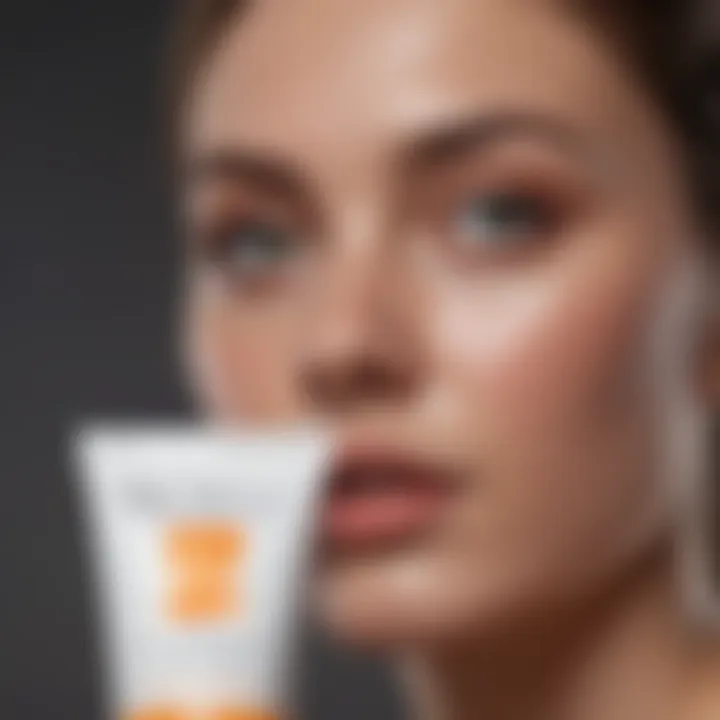Choosing the Best Sunscreen for Oily Skin


Intro
Selecting the right face sunscreen can be a complex task, especially for those with oily skin. Oily skin can lead to issues like acne and discomfort, which makes the choice of sunscreen critical. It is essential to understand how different formulations can impact the skin. The goal here is to equip individuals with the necessary knowledge to make informed choices.
Sun protection is important for everyone, but the characteristics of oily skin require specific attention. This article will explore different formulations, the right ingredients to seek and avoid, and effective application techniques. By focusing on these aspects, readers will gain valuable insights into maintaining skin health while enjoying sun exposure.
Understanding Oily Skin
Understanding oily skin is crucial when choosing an effective face sunscreen. The characteristics of oily skin can significantly influence how your skin reacts to products, including those meant for UV protection. Recognizing this type of skin helps one make informed decisions, ensuring that the sunscreen used not only provides sun protection but also complements the unique needs of oily skin.
Defining Oily Skin
Oily skin is defined as skin that produces an excess of sebum, a natural oil produced by sebaceous glands. The primary function of sebum is to keep the skin moisturized and protected. However, when sebum production is excessive, it can lead to a shiny complexion, enlarged pores, and a propensity for acne and blemishes. Factors influencing oily skin include genetics, hormonal changes, and environmental elements. Identifying and confirming oily skin can be as simple as noticing a greasy sheen on the face several hours after washing or experiencing frequent breakouts.
Characteristics of Oily Skin
Oily skin presents several distinctive features. First, it often appears shiny, especially on the forehead, nose, and chin, commonly referred to as the T-zone. This shine results from the overproduction of sebum. Next, individuals with this skin type typically have enlarged pores due to the accumulation of oil and dead skin cells. Blackheads and acne are frequent and can be more challenging to manage, as the excessive oil can trap bacteria within the pores. Finally, while oily skin can sometimes offer a youthful appearance due to additional moisture, it may still suffer from uneven texture or redness associated with inflammation.
Common Challenges with Oily Skin
Individuals with oily skin face challenges daily. The most prominent issue is acne breakouts, which can arise from clogged pores as oil accumulates with other impurities. Furthermore, using products unsuitable for oily skin, such as heavy creams or oils, can exacerbate the problem, leading to more breakouts. Another challenge is finding the right sunscreen. Many sunscreens are heavy or greasy, which can aggravate the oiliness and lead to further skin issues. Therefore, understanding these challenges is essential when making the right choice in sunscreen.
"Selecting a suitable face sunscreen is paramount for maintaining skin health, especially for those with oily complexions."
Addressing the specific needs of oily skin is not just about choosing a product but about understanding its distinct nature to foster a healthier skin environment. Armed with this knowledge, one can effectively select the right sunscreen tailored specifically for oily skin.
The Importance of Sunscreen
Sunscreen plays a crucial role in safeguarding the skin against harmful ultraviolet rays. For individuals with oily skin, selecting the right sunscreen formulation is especially vital. The objective is to protect the skin while preventing excess oiliness and breakouts. This section explores the role of sunscreen in skincare, the consequences of UV exposure, and how sunscreen acts as a preventative measure for skin health.
Role of Sunscreen in Skincare
Sunscreen is a fundamental element in any skincare regimen. Its primary function is to absorb or reflect UV radiation, reducing the risk of sun damage. For people with oily skin, using a proper sunscreen helps maintain skin balance. Suitable formulations can prevent comedones, which can lead to blackheads and other forms of acne.
- Shields Against UV Damage: Sunscreen protects against immediate sunburn and prevents long-term damage that can age the skin.
- Maintains Skin Health: Regular usage can reduce the appearance of hyperpigmentation and fine lines.
Incorporating sunscreen into daily routines is paramount, regardless of the weather. Cloudy days can still allow UV rays to penetrate the skin, making it essential to remain vigilant about sun protection.
Consequences of UV Exposure
Failing to use sunscreen exposes the skin to various adverse effects. The consequences of UV exposure can be severe, ranging from aesthetic concerns to serious health issues.
- Premature Aging: Prolonged exposure to UV rays results in the breakdown of collagen and elastin, leading to premature fine lines and wrinkles.
- Sunburn: Acute reactions from UV exposure can cause painful sunburn, characterized by redness, swelling, and tenderness.
- Increased Risk of Skin Cancer: Both basal cell carcinoma and melanoma have been linked to cumulative sun exposure. Protecting the skin with an effective sunscreen can significantly reduce this risk.
It is evident that the implications of neglecting proper sun protection are far-reaching and should not be dismissed lightly.
Sunscreen as a Preventative Measure
Using sunscreen regularly is indeed a preventative action against various skin ailments. It acts as a barrier against damaging UV rays and environmental stressors that can exacerbate oily skin conditions. By incorporating sunscreen into daily routines, one is not only promoting skin health but also taking proactive steps to prevent future skin issues.
"Applying sunscreen can minimize the risk of skin damage, ensuring healthier skin as one ages."
Additionally, it assists in preventing oxidative stress caused by UV exposure, which can accelerate skin aging. Choosing the right product tailored for oily skin helps avoid clogged pores, giving a sense of comfort and cleanliness throughout the day.
Suitable Ingredients for Oily Skin
Identifying suitable ingredients for oily skin is crucial when selecting a face sunscreen. Oily skin often leads to excess shine and the potential for breakouts. Therefore, the right components in a sunscreen can make a significant difference, ensuring protection from harmful UV rays without exacerbating skin issues.
Lightweight Formulations
When considering sunscreens for oily skin, lightweight formulations are favored. These products typically include gel or water-based textures. They absorb quickly and do not leave a greasy residue. This is important because heavy sunscreens can clog pores, leading to more oiliness and breakouts.
Lightweight formulas can keep the skin feeling fresh. They provide sun protection without overwhelming the skin's oil production. Look for sunscreens that specify they are lightweight or designed for oily or acne-prone skin.
Some examples of lightweight ingredients to look for are:
- Hyaluronic Acid: This helps retain moisture without added oil.
- Glycerin: It hydrates the skin, creating a barrier without being heavy.
- Silicones: Ingredients like dimethicone offer a smooth application while controlling shine.


Non-comedogenic Ingredients
Another significant aspect to consider is the inclusion of non-comedogenic ingredients. Sunscreens marked as non-comedogenic indicate that they won't clog pores. For oily skin types, this is essential to reduce the chance of breakouts associated with pore blockage.
Common non-comedogenic ingredients found in suitable sunscreens include:
- Zinc Oxide: This provides broad-spectrum UV protection and is typically gentle on the skin.
- Titanium Dioxide: Another physical blocker that protects without contributing to oiliness.
- Niacinamide: Particularly beneficial, it can help regulate oil production and improve skin texture.
"Choosing non-comedogenic products is vital in preventing acne and maintaining a clear complexion."
Benefits of Oil-Free Products
Oil-free products are highly recommended for those with oily skin. Unlike traditional sunscreens that might contain heavy oils, oil-free formulations provide protection without adding extra oil. They often feature absorbent ingredients that can help control excess shine throughout the day.
The benefits of oil-free sunscreens include:
- Less Clogging: They help keep pores clear and reduce the risk of breakouts.
- Matte Finish: Many oil-free sunscreens are designed to dry down to a matte finish, making it ideal for a polished look.
- Comfortable Wear: Oil-free options typically feel lighter on the skin, making them pleasant for daily use.
Selecting sunscreen with these ingredients makes a measurable difference for those managing oily skin. Choosing wisely leads to healthier, protected skin without the added complications that come from poor product choices.
Ingredients to Avoid in Sunscreens
Choosing the right sunscreen for oily skin not only involves selecting beneficial ingredients but also entails avoiding those that can exacerbate oiliness or cause irritation. Certain components commonly found in sunscreens can negatively impact oily skin. Understanding which ingredients are best avoided is crucial for achieving clear, healthy-looking skin while still benefiting from sun protection.
Heavy Oils and Waxes
Many sunscreens contain heavy oils and waxes that can clog pores and lead to breakouts. Oily skin individuals may already have an excess of sebum production, and adding heavy ingredients can worsen this issue. Ingredients like coconut oil or beeswax can create a barrier that traps oil and dirt on the skin’s surface. Rather than protecting, they can lead to clogged pores and acne flare-ups. It’s essential to opt for lighter formulations that ensure adequate sun protection without the undesired heaviness.
Alcohol and Irritant Components
Alcohol is a common ingredient in sunscreens as it helps solvents evaporate quickly. However, certain types of alcohol can be particularly drying and irritating to the skin. For individuals with oily skin, products containing denatured alcohol or isopropyl alcohol should be avoided. These components can strip oil from the skin, prompting an increase in oil production as a compensatory mechanism. Additionally, fragrances, parabens, or artificial colorants should also be considered irritants. Always check labels for these types of alcohols, as they can lead to inflammation and sensitivity, negating the beneficial effects of sun protection.
Fragrance Sensitivities
Fragrances in sunscreen formulations may appeal to the senses but can pose a risk for those with oily or sensitive skin. Synthetic fragrances are known allergens and can trigger reactions such as redness, itching, or swelling. While it might be tempting to choose a sunscreen based on its pleasant scent, it is wiser to prioritize formulations labeled as "fragrance-free" or "hypoallergenic". This precaution reduces the likelihood of adverse skin reactions and allows for a focus on effective sun protection without the added risk of irritation.
Always read the ingredient list before purchasing sunscreen. Avoid formulations that include heavy oils, drying alcohols, and irritating fragrances to maintain the integrity of oily skin.
By steering clear of these detrimental ingredients, individuals with oily skin can make more informed choices about their sunscreen options, leading to better skin health and reduced risk of breakouts.
Sunscreen Application Techniques
Sunscreen application techniques play a crucial role in ensuring effective sun protection, especially for individuals with oily skin. The right techniques enhance the product's efficacy, offering better defense against harmful UV rays while accommodating the unique characteristics of oily skin. Proper application can mitigate issues such as clogged pores and excess shine, making it essential for anyone committed to skin health and protection.
Timing of Application
The timing of sunscreen application greatly influences its effectiveness. Generally, it is advised to apply sunscreen about 15 to 30 minutes before sun exposure. This timing allows the active ingredients to bind effectively to the skin and provide optimal protection. For those with oily skin, using sunscreen in the morning as part of a daily skincare routine helps create a barrier before any makeup application.
It's also advisable to apply sunscreen after any moisturizing or treatment products. For instance, if one incorporates serums or oils in their routine, sunscreen should follow to ensure that it adheres to the skin well and prevents interactions that may reduce efficacy.
Amount of Product to Use
Another important element is the quantity of sunscreen applied. Many people underestimate the amount required, leading to insufficient coverage. A common guideline is to use about a nickel-sized amount for the face and a shot glass full for the body. This quantity ensures a thorough and even application. For oily skin, opting for products that are lightweight can prevent the skin from feeling greasy.
The importance of application cannot be overlooked; uneven application can create areas of vulnerability that UV rays can exploit. Therefore, consistency across all areas, including hard-to-reach spots, is vital.
Layering Sunscreen with Other Products
Layering products is a common practice in skincare, but it requires some strategic thinking, especially with sunscreen. For those with oily skin, the goal is to prevent overwhelming the skin with heavy formulations while ensuring adequate protection. Start with a lightweight sunscreen, followed by any makeup or other skincare products. If using mineral sunscreens, it’s important to apply them as the final step in your routine to avoid interference with their performance.
Also, consider using powder sunscreens for reapplication throughout the day; they can be layered over makeup without causing disruption. This method provides an effective means of maintaining protection throughout any activities.
It is essential to take the time to focus on specific sunscreen application techniques. Proper timing, correct product amount, and smart layering tactics can significantly enhance the effectiveness of skin protection and comfort, especially for oily skin types.
Types of Sunscreens for Oily Skin
Selecting the right sunscreen is essential for individuals with oily skin. Not all formulations deliver the same benefits, and understanding these variations can significantly impact skin health and appearance. The choice of sunscreen can help maintain a balanced complexion and prevent excessive oiliness throughout the day.


Gel-Based Sunscreens
Gel-based sunscreens are particularly advantageous for oily skin types. These formulations are typically lightweight and quickly absorb into the skin, making them an ideal choice for those prone to breakouts. They provide protection without the heavy feel associated with cream-based products. High levels of water or gel content allow for a refreshing finish, which aids in preventing that shiny appearance often related to oily skin. Look for products containing hyaluronic acid or aloe vera to increase hydration without clogging pores.
Benefits of Gel-Based Sunscreens:
- Fast absorption and non-greasy feel
- Hydrating while controlling excess oil
- Often designed to be non-comedogenic, reducing the risk of breakouts
Spray Sunscreens
Spray sunscreens offer a convenient option for those with oily skin, delivering an easy application with minimal mess. They can be particularly useful for reapplication throughout the day, especially during outdoor activities. The fine mist ensures even coverage while allowing the skin to breathe. When selecting a spray sunscreen, opt for one that specifically states it is suitable for oily skin. Avoid those with added oils or fragrances that can exacerbate shine and irritation.
Advantages of Spray Sunscreens:
- Quick and effortless application
- Good for on-the-go lifestyles
- Provides a lighter feel than creams, reducing potential for greasiness
Matte Finish Formulations
Matte finish sunscreens are highly desirable for individuals with oily skin. These formulations are specifically designed to dry down without leaving a shiny residue. The matte effect helps to reduce shine and can be a good base under makeup, promoting a polished look. Sunscreens that incorporate silica or kaolin clay can absorb excess oil, keeping the skin looking fresh. It is beneficial to check that the product is also labeled as oil-free or suited for oily skin.
Key Features of Matte Finish Formulations:
- Reduces shine throughout the day
- Provides a good base for makeup application
- Often includes ingredients that help absorb excess oil
In summary, the types of sunscreens available for oily skin provide different formulations tailored to specific needs. Gel-based, spray, and matte finish options can enhance protection while addressing the unique challenges of oily skin. Knowing these distinctions helps in choosing the right product to achieve both sun protection and a balanced complexion.
Recommended Sunscreen Products
Choosing the right sunscreen is crucial for all individuals, especially for those with oily skin. Oily skin can complicate sunscreen selection as it may lead to breakouts or a greasy appearance. This section provides insights into recommended products tailored specifically for this skin type, taking into account various formulations and ingredients.
Products designed for oily skin often focus on specific elements that help maintain a balanced and healthy complexion. These products should provide adequate sun protection without overwhelming the skin. Additionally, the ideal sunscreen will present benefits such as oil control, lightweight texture, and non-comedogenic properties, ensuring that the skin does not become excessively oily throughout the day.
Top Rated Gel-Based Options
Gel-based sunscreens are well-known choices for oily skin. They are lightweight and absorb quickly, leaving little to no residue. This makes them ideal for individuals who are concerned about their skin looking shiny or greasy.
Some top-rated gel-based sunscreens include:
- Neutrogena Hydro Boost Water Gel SPF 30: This sunscreen not only protects from the sun but also hydrates the skin due to its hyaluronic acid content.
- L'Oréal Paris Revitalift Bright Reveal Oil-Free Sunscreen SPF 30: Offers broad-spectrum protection while maintaining an oil-free texture.
- La Roche-Posay Anthelios Dermo-Kids Fluid SPF 50: While designed for kids, this fluid formula is perfect for sensitive and oily skin.
These options effectively provide sun protection while minimizing the oily feel on the skin.
Best Spray Formulas
Spray sunscreens are another viable option for those with oily skin. They offer convenience and often come with a matte finish. Their airy texture can be refreshing, especially during warmer months.
Some of the best spray formulas for oily skin include:
- Banana Boat Ultra Sport Spray Sunscreen SPF 50: This sunscreen is designed for high-performance activities, providing lasting coverage.
- Coppertone Sport Continuous Spray Sunscreen SPF 50: Offers exceptional sweat and water resistance, making it perfect for outdoor activities.
- Supergoop! Defense Refresh Setting Mist SPF 50: This product serves dual purposes of setting makeup while providing sun protection.
These spray options can be applied easily and effectively control oil and shine throughout the day.
Popular Matte Finish Brands
Matte finish sunscreens are particularly appealing to individuals with oily skin. These formulations help combat shine while ensuring good sun protection.
Some popular brands that offer matte finish options are:
- Kiehl's Ultra Light Daily UV Defense Foundation SPF 50: It combines sun protection with a lightweight foundation for coverage.
- EltaMD UV Clear Broad-Spectrum SPF 46: This formulation is lightweight and offers a matte finish, making it ideal for sensitive and oily skins.
- Murad Oil-Control Mattifier SPF 15: Specifically formulated to absorb oil, it helps keep skin matte and protected throughout the day.
Using these products can greatly reduce the slick feel often associated with oily skin while still providing necessary sun protection.
Always patch-test new products to ensure compatibility with your skin.
In summary, selecting the right sunscreens can profoundly affect how oily skin responds to sun exposure. The choices listed above cater specifically to the need for oil control while providing adequate protection. Whether opting for a gel, spray, or a matte finish, individuals can find suitable options to keep their skin healthy in the sun.
Regular Sunscreen Regimen


Establishing a regular sunscreen regimen is critical for individuals with oily skin. Sunscreen should not be considered an optional step; it is a fundamental part of daily skincare. This emphasizes the importance of consistent application to prevent skin damage from UV rays and environmental factors. An effective regimen not only protects the skin but also helps in managing oiliness and breakouts that can be exacerbated by sun exposure.
Daily Use Guidelines
Daily usage of sunscreen is vital, regardless of the weather conditions. Many assume that it is unnecessary on cloudy days or during winter months. However, up to 80% of UV rays can penetrate clouds. Select a sunscreen suited for oily skin that is lightweight and does not leave a greasy residue. A broad spectrum SPF of at least 30 is recommended. Apply it generously on all exposed skin about 15 minutes before going outdoors. Reapply every two hours, or immediately after sweating or swimming.
Reapplication Techniques
Proper reapplication techniques are crucial. It's easy to overlook this step, especially during busy days. To reapply without disturbing makeup, consider using a sunscreen spray or powder with SPF. Specifically designed for oily skin, these products can provide refreshment without added heaviness. Alternatively, you can use clean fingers to layer more lotion over foundations. Ensure to cover your nose, ears, and neck as these areas are often neglected yet highly susceptible to sun damage.
Adjusting Regimen for Different Seasons
Seasonal adjustments to your sunscreen routine can also improve protection and comfort. In summer, opt for gel-based sunscreens since they feel lighter and can prevent excess shine. During colder months, integrate a moisturizer with SPF for added hydration, as oily skin can be prone to dryness in harsher conditions. Always keep in mind factors like humidity and sun intensity when choosing your sunscreen; some products work better in certain climates.
"Daily sun protection is crucial for maintaining healthy skin, particularly for those with oily skin prone to acne or breakouts."
In summary, cultivating a regular sunscreen regimen tailored to oily skin is essential. By adhering to daily use guidelines, employing effective reapplication techniques, and adjusting your regimen according to the seasons, individuals can significantly enhance their skin's protection against harmful UV rays while managing oil levels effectively.
Navigating SPF Ratings
Understanding SPF ratings is essential when selecting a sunscreen, particularly for those with oily skin. The SPF, or Sun Protection Factor, indicates the level of protection a sunscreen provides against the sun's harmful UVB rays. These rays are primarily responsible for sunburn and can contribute to skin cancer. A higher SPF number suggests a greater level of protection, but this can often lead to misconceptions about what SPF actually means.
Understanding SPF Numbers
SPF numbers reflect the amount of time you can theoretically stay in the sun without getting sunburned compared to not wearing any sunscreen. For instance, an SPF of 30 will protect you 30 times longer than if you were not wearing sunscreen. However, this assumes a perfect application and reapplication, which is rarely the case in practice. It's worth noting that SPF only measures protection against UVB rays, not UVA rays, which can also damage the skin. Many people find that they do not apply enough product, which significantly reduces the level of protection.
Broad Spectrum Protection Explained
Broad-spectrum protection is another critical factor in choosing the right sunscreen. This term means the sunscreen effectively blocks both UVA and UVB rays. UVA rays penetrate deeper into the skin and can lead to premature aging and skin cancers. Thus, using a broad-spectrum sunscreen helps to guard against the full spectrum of UV damage. When selecting a sunscreen, look for labels specifically marking it as broad-spectrum to ensure comprehensive skin protection.
How Much SPF is Necessary?
The necessary SPF can vary based on several factors, including skin type, location, and time of day. Generally, for oily skin, an SPF of at least 30 is recommended, as it offers sufficient protection for most individuals. However, if you are outdoors for extended periods or have a lighter skin tone, consider using SPF 50 or higher. Additionally, remember to reapply sunscreen every two hours or immediately after swimming or sweating to maintain its effectiveness.
Key Insight: Always choose a sunscreen that fits your skin type and consider factors like duration of sun exposure and environmental conditions.
Sunscreens in Different Climates
Understanding the impact of different climates on sunscreen efficacy is essential for those with oily skin. Environmental factors can significantly influence how sunscreens perform and how our skin reacts to them. Different climates present diverse challenges, requiring specific products and application methods to ensure effective skin protection.
Urban vs. Rural Environments
Urban environments usually expose skin to pollution and UV rays. Cities often have higher levels of smog, which can lead to oxidative stress, damaging skin even with sunscreen application. This makes sunscreen even more critical for urban dwellers. Look for formulations that contain antioxidants, as they can protect the skin against damage from environmental stressors.
In rural areas, the exposure to direct sunlight is often more intense, especially if there is less natural shade. Here, water-resistant sunscreens can be very benefitial, as they protect the skin during outdoor activities. Choosing a broad-spectrum sunscreen with a high SPF is vital.
Outdoor Activities Considerations
When it comes to outdoor activities, sunscreen needs change based on the type of activity and duration of exposure. Engaging in sports or leisure activities often leads to increased perspiration and potential product removal. For this reason, opt for gel-based or water-proof formulations that can withstand sweat and humidity.
Using SPF products designed for active lifestyles helps maintain sun protection and prevents oily skin from becoming overly greasy. Regular reapplication is also essential, especially if engaged in activities like swimming or biking. A rule of thumb could be to reapply every two hours, or after significant sweating or water exposure.
Traveling with Sunscreen
Traveling poses an array of challenges when maintaining a suitable sunscreen regimen. Different locations come with varying climates, which can alter how a sunscreen will work on your skin. For example, tropical climates may require heavier or more moisturizing formulas, while colder environments may necessitate those that provide additional hydration.
Moreover, consider packing travel-sized products for convenience. Ensure your chosen products comply with airline regulations for liquids. When arriving at a new destination, check the UV index and adjust your sunscreen accordingly. For oily skin, having an oil-free or matte-finish sunscreen on hand can be beneficial, keeping your skin protected without adding shine.
It is crucial to choose appropriate sunscreen products not just for the season or occasion but tailored to the specific environment you are in to ensure optimal skincare results.
Ending
Summarizing Key Points
To encapsulate our discussion:
- Understanding your skin type is the first step. Oily skin requires special attention in selecting products that will not exacerbate the situation.
- Ingredients matter. Look for lightweight and non-comedogenic formulations to minimize potential breakouts. Avoid heavy oils and irritants that could worsen skin conditions.
- Application techniques are crucial for achieving maximum effectiveness. Proper timing and quantity enhance the product's protective qualities.
- Sunscreen in various conditions plays an important role. Adjustments based on environment or activity can significantly impact skin protection levels.
Encouragement for Seeking Suitable Products
It is critical that individuals with oily skin take the time to find the right sunscreen tailored to their needs. Explore different options and understand how various ingredients affect your skin. Not all sunscreens are created equal; thus, trial and error may be necessary until finding the ideal match.
In summary, prioritizing sunlight protection through appropriate sunscreen choices is not just about the product itself; it is about investing in your skin's future. Thus, making informed choices is essential, ensuring your regimen aids in maintaining healthy, vibrant skin.



